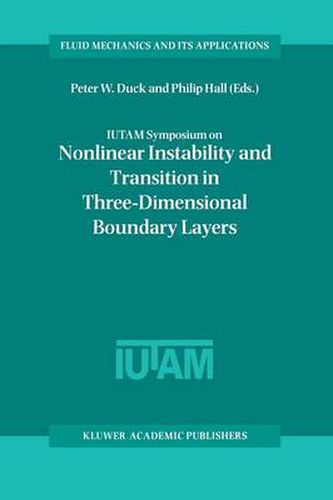Readings Newsletter
Become a Readings Member to make your shopping experience even easier.
Sign in or sign up for free!
You’re not far away from qualifying for FREE standard shipping within Australia
You’ve qualified for FREE standard shipping within Australia
The cart is loading…






This title is printed to order. This book may have been self-published. If so, we cannot guarantee the quality of the content. In the main most books will have gone through the editing process however some may not. We therefore suggest that you be aware of this before ordering this book. If in doubt check either the author or publisher’s details as we are unable to accept any returns unless they are faulty. Please contact us if you have any questions.
Most fluid flows of practical importance are fully three-dimensional, so the non-linear instability properties of three-dimensional flows are of particular interest. In some cases the three-dimensionality may have been caused by a finite amplitude disturbance whilst, more usually, the unperturbed state is three-dimensional. Practical applications where transition is thought to be associated with non-linearity in a three- dimensional flow arise, for example, in aerodynamics (swept wings, engine nacelles, etc.), turbines and aortic blood flow. Here inviscid “cross-flow’ disturbances as well as Tollmien-Schlichting and Goertler vortices can all occur simultaneously and their mutual non-linear behaviour must be understood if transition is to be predicted. The non-linear interactions are so complex that usually fully numerical or combined asymptotic/numerical methods must be used.
Moreover, in view of the complexity of the instability processes, there is also a growing need for detailed and accurate experimental information. Carefully conducted tests allow us to identify those elements of a particular problem which are dominant. This assists in both the formulation of a relevant theoretical problem and the subsequent physical validation of predictions. It should be noted that the demands made upon the skills of the experimentalist are high and that the tests can be extremely sophisticated - often making use of the latest developments in flow diagnostic techniques, automated high speed data gathering, data analysis, fast processing and presentation.
$9.00 standard shipping within Australia
FREE standard shipping within Australia for orders over $100.00
Express & International shipping calculated at checkout
This title is printed to order. This book may have been self-published. If so, we cannot guarantee the quality of the content. In the main most books will have gone through the editing process however some may not. We therefore suggest that you be aware of this before ordering this book. If in doubt check either the author or publisher’s details as we are unable to accept any returns unless they are faulty. Please contact us if you have any questions.
Most fluid flows of practical importance are fully three-dimensional, so the non-linear instability properties of three-dimensional flows are of particular interest. In some cases the three-dimensionality may have been caused by a finite amplitude disturbance whilst, more usually, the unperturbed state is three-dimensional. Practical applications where transition is thought to be associated with non-linearity in a three- dimensional flow arise, for example, in aerodynamics (swept wings, engine nacelles, etc.), turbines and aortic blood flow. Here inviscid “cross-flow’ disturbances as well as Tollmien-Schlichting and Goertler vortices can all occur simultaneously and their mutual non-linear behaviour must be understood if transition is to be predicted. The non-linear interactions are so complex that usually fully numerical or combined asymptotic/numerical methods must be used.
Moreover, in view of the complexity of the instability processes, there is also a growing need for detailed and accurate experimental information. Carefully conducted tests allow us to identify those elements of a particular problem which are dominant. This assists in both the formulation of a relevant theoretical problem and the subsequent physical validation of predictions. It should be noted that the demands made upon the skills of the experimentalist are high and that the tests can be extremely sophisticated - often making use of the latest developments in flow diagnostic techniques, automated high speed data gathering, data analysis, fast processing and presentation.